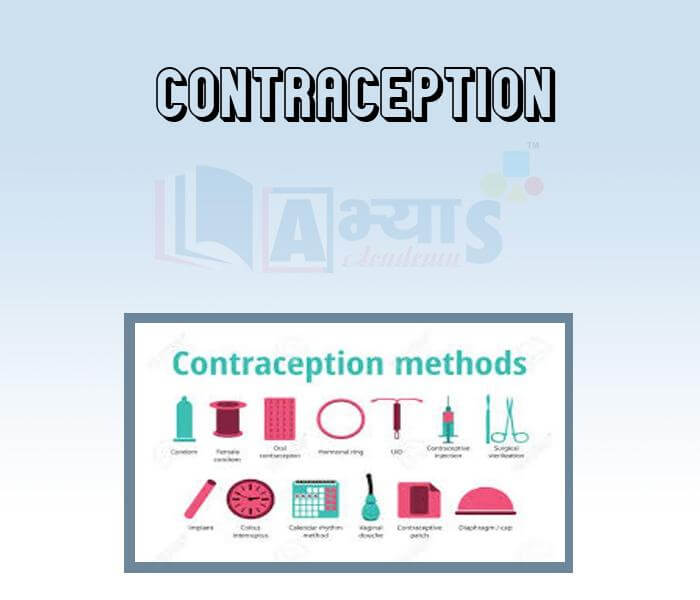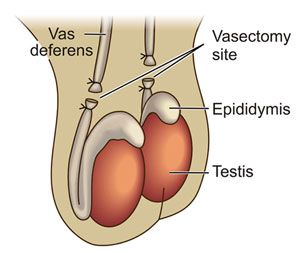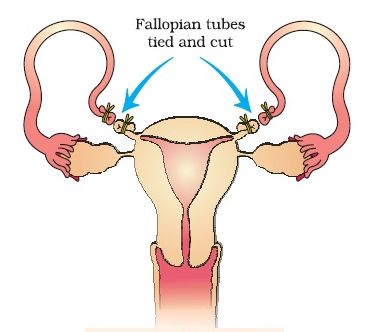Contraception







Contraception
Contraception: It is possible to limit the size of a family through various means. One is to prevent pregnancy. Fertilization of the ovum and its subsequent implantation is referred to as conception or pregnancy. Prevention of conception is called contraception. Conception can be prevented in two different ways.
1. Natural/ Traditional method : It works on the principle of avoiding chances of ovum and sperms meeting. It includes :
(i) Periodic abstinence : It involves avoiding of coitus from days 10 to 17 oft eh menstural cycle, when ovulation could be expected. The chances of fertilization are very high in this period. It is called fertile period.
(ii) Coitus interruptus : It involves withdarwal of penis from the vagina just before ejaculation, so as to avoid insemination into the vagina.
(iii) Lactational amenorrhea : It involves the prevention of conception by breastfeeding the child. Ovulation and the cycle do not occur during the period of lactation.
2. Artificial methods :
(i) Barrier methods : There are a number of methods of contraception that create a mechanical barrier between the sperms and the egg. One method is to use a fine rubber tube called condom. This is worn over the penis during sexual intercourse, so that semen is collected in this tube and not discharged in the vagina. This method also prevents the spread of AIDS and many other sexually transmitted diseases. A diaphragm or cap can be fitted in the cervix of a woman to prevent semen from reaching the Fallopian tube.
Spermicidal creams, jellies and foams are used along with barriers to increase contraceptive efficiency.
An intrauterine contraceptive device (IUCD) is the device used only by females. These are inserted by doctors or expert nurses. This includes
i. Non - medicated IUDs(e.g. Lippes loop)
ii Copper releasing IUDs (e.g. CuT, Cu7, Multiload 375)
iii Hormone releasing IUDs(e.g. Progestasert, LNLNG- 20). These make uterus unsuitble for implantation.
(ii)Chemical methods: Oral contraceptives can be taken to change the hormonal balance of the body so that the ovum is not released from the ovary. Since the ovum does not come into the fallopian tube, it is not fertilized. Oral contraceptives are tablets which a woman has to take every day. These are also called birth control pills. Of all the contraceptive measures, oral contraceptive pills are the most effective. However, the change of hormonal balance caused by the intake of oral contraceptives occasionally has undesirable side effects.
Surgical methods: If the vas deferens, which carries the sperms to the urethra, is tied by a thread, the sperms cannot go past the tied point. The vas deferens can be exposed by a slight incision at the base of the scrotum. This incision and subsequent ligature (tying by thread) of the vas deferens by a surgeon is called vasectomy. In women, ligature of the Fallopian tube can prevent the passage of ova down the fallopian tube. This is called tubectomy. Both vasectomy and tubectomy ensure that fertilization will not take place. Surgery can also be used for aborting unwanted pregnancies. However, this is often misused for illegally aborting female foetuses. (The killing of a foetus is called foeticide.) To prevent female foeticide, prenatal sex determination has been prohibited by law.


Vasectomy Tubectomy
From where can someone get contraception for free : | |||
| Right Option : D | |||
| View Explanation |
Methods use to prevent fertillzation in humans is referred as ________________________ | |||
| Right Option : B | |||
| View Explanation | |||
_______________ aims to prevent pregnancy. | |||
| Right Option : A | |||
| View Explanation | |||
Students / Parents Reviews [20]
My experience with Abhyas Academy has been very good. When I was not in Abhyas whenever teacher ask questions I could not speak it confidently but when I came in Abhyas, my speaking skills developed and now I am the first one to give the answer of teachers question.

Upmanyu Sharma
7thMy experience with Abhyas is very good. I have learnt many things here like vedic maths and reasoning also. Teachers here first take our doubts and then there are assignments to verify our weak points.

Shivam Rana
7thWhen I have not joined Abhyas Academy, my skills of solving maths problems were not clear. But, after joining it, my skills have been developed and my concepts of science and SST are very well. I also came to know about other subjects such as vedic maths and reasoning.

Sharandeep Singh
7thIt was a good experience with Abhyas Academy. I even faced problems in starting but slowly and steadily overcomed. Especially reasoning classes helped me a lot.

Cheshta
10thOne of the best institutes to develope a child interest in studies.Provides SST and English knowledge also unlike other institutes. Teachers are co operative and friendly online tests andPPT develope practical knowledge also.

Aman Kumar Shrivastava
10thI have spent a wonderful time in Abhyas academy. It has made my reasoning more apt, English more stronger and Maths an interesting subject for me. It has given me a habbit of self studying

Yatharthi Sharma
10thA marvelous experience with Abhyas. I am glad to share that my ward has achieved more than enough at the Ambala ABHYAS centre. Years have passed on and more and more he has gained. May the centre flourish and develop day by day by the grace of God.

Archit Segal
7thThird consective year,my ward is in Abhyas with nice experience of admin and transport support.Educational standard of the institute recumbent at satisfactory level. One thing would live to bring in notice that last year study books was distributed after half of the session was over,though study ...

Ayan Ghosh
8thBeing a parent, I saw my daughter improvement in her studies by seeing a good result in all day to day compititive exam TMO, NSO, IEO etc and as well as studies. I have got a fruitful result from my daughter.

Prisha Gupta
8thMy experience with Abhyas academy is very good. I did not think that my every subject coming here will be so strong. The main thing is that the online tests had made me learn here more things.

Hiya Gupta
8thUsually we see institutes offering objective based learning which usually causes a lag behind in subjective examinations which is the pattern followed by schools. I think it is really a work of planning to make us students grab the advantages of modes of examination, Objective Subjective and Onli...

Anika Saxena
8thAbhyas is good institution and a innovative institute also. It is a good platform of beginners.Due to Abhyas,he has got knoweledge about reasoning and confidence.My son has improved his vocabulary because of Abhyas.Teacher have very friendly atmosphere also.

Manish Kumar
10thAbhyas institute is one of the best coaching institute in the vicinity of Ambala Cantt area. The teachers of the institute are well experienced and very helpful in solving the problems of the students.The good thing of the institute is that it is providing extra classes for the students who are w...

Aman Kumar Shrivastava
10thAbhyas institute is one of the best coaching institute in the vicinity of Ambala cantt.The institute provides good and quality education to the students.The teachers are well experienced and are very helpful in solving the problems. The major advantages of the institute is extra classes for weak...

Shreya Shrivastava
8thWe started with lot of hope that Abhyas will help in better understnding of complex topics of highers classes. we are not disappointed with the progress our child has made after attending Abhyas. Though need to mention that we expected a lot more. On a scale of 1-10, we would give may be 7.

Manya
8thThe experience was nice. I studied here for three years and saw a tremendous change in myself. I started liking subjects like English and SST which earlier I ran from. Extra knowledge gave me confidence to overcome competitive exams. One of the best institutes for secondary education.

Aman Kumar Shrivastava
10thIn terms of methodology I want to say that institute provides expert guidence and results oriented monitering supplements by requsite study material along with regular tests which help the students to improve their education skills.The techniques of providing education helps the students to asses...

Aman Kumar Shrivastava
10thMy experience with Abhyas academy is very nice or it can be said wonderful. I have been studying here from seven class. I have been completing my journey of three years. I am tinking that I should join Abhyas Academy in tenth class as I am seeing much improvement in Maths and English

Hridey Preet
9thAbhyas Methodology is very good. It is based on according to student and each child manages accordingly to its properly. Methodology has improved the abilities of students to shine them in future.

Manish Kumar
10thAbhyas academy is great place to learn. I have learnt a lot here they have finished my fear of not answering.It has created a habit of self studying in me.The teachers here are very supportive and helpful. Earlier my maths and science was good but now it has been much better than before.
